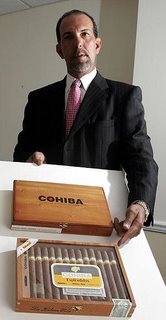
Happy Halloween. In that spirit, the government wants its witnesses to wear disguises. Ze'ev Rosenstein's lawyers, Roy Black and Howard Srebnick, think this is a bad idea... Here is the intro from their response to the government motion for its witnesses to wear "light disguises":
Under the government’s proposed procedures, the defense may not conduct its own investigation of the surveillance officers, and instead must accept the government’s claim that "none of these officers have . . . information in their background that would provide ammunition for cross-examination . . . ." [Government’s Motion at 7].
Also under the government’s proposed procedures, the defense and the jury may not see or assess the true emotions and expressions of the surveillance officers while they testify.
Finally, the defense may not cross-examine these anonymous and veiled foreign witnesses about their procedures and techniques, and must accept their testimony that they were at all times able to accurately observe and identify people and what they were doing.
***
President Eisenhower once described face-to-face confrontation as part of the code of his hometown of Abilene, Kansas. In Abilene, he said, it was necessary to "[m]eet anyone face to face with whom you disagree. You could not sneak up on him from behind, or do any damage to him, without suffering the penalty of an outraged citizenry . . . In this country, if someone dislikes you, or accuses you, he must come up in front. He cannot hide behind the shadow." Coy v. Iowa, 487 U.S. 1012, 1017-18 (1988).
A wig, make up, and fake facial hair is not "light disguise," as the government states. It is a complete costume, the shadow to which President Eisenhower refers. After all, the purpose of the disguise is to make the witness look like someone else entirely – to be unrecognizable. In Israel, and presumably in this Court if allowed, the witness will not only wear full facial disguise, but s/he will also wear a turtleneck shirt and a large overcoat, so that only a fake face is seen. If the witness fidgets, the coat will hide it. If he is a bald male and his head perspires when nervous, the wig will hide it. If his mouth twitches slightly, the fake facial hair will hide it. If she is a female and her ears turn red during testimony, the wig will hide it. If the veins on the neck enlarge out of fear or anger, the turtleneck will hide it. If the face turns pale during testimony, the make up will hide it. Essentially, the person on the witness stand will be a fake.
Lots of other good stuff in this response. Any bets on what Judge D will do?






